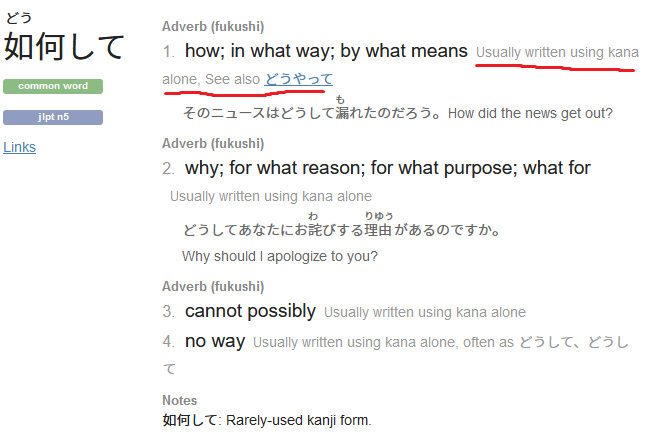I’ve just discovered that if [/details] is in the same line of the text, it does not work 
彼は若いのにとてもしっかりだよね
Translation
Even though he is young he is very mature.
今日、「~たばかり」と「~化する」と「~ように~」を勉強しました。
簡単な勉強できるように、全部の筆記をデータ化したばかりだ。
Translation
In order to study more easily, I just digitized all of my notes.
今日、「そういう」を勉強しました。
こういう犬はかわいいです。
そういうハンバーガーは私の国で買えません。
ああいう車は高くないです。
どういう映画はすきですか?
Translation
This kind of dog is cute.
I can’t buy these kind of hamburgers in my country.
That car is not expensive.
What kind of movies do you like?
今日、「~かしら」と「~らしい」と「~にみえる」を勉強しました。
私、貧乏らしくみえるかしら。
Translation
I wonder if I look poor.
昨日は「に当たる」、「さーFiller」と「また〜も」勉強した。
BlazblueのDistortionDriveはStreet FighterのSuper Comboに当たる。
Translation
Blazblues Distortion Drives equals to Street Fighters Super Combo.
あのさ、如何してここにくるの。
"Translation:
Say err, why did you come here?
武天老師はSuper Dashできない。けど彼の逆かめはめ 波はのと同じくらいの目的でする。
又向こうで的も打つできる。
Translation:
Muten Roshi (Master Roshi in english) can’t do a super Dash. But his reverse Kame-Hame-Ha serves the same purpose. In Addition it can hit opponents on the opposite side.
[In the second sentence I used 「如何して」. I have heard 「どうして」 a lot in Anime where it was translated as why, but did not know how to write it, so I looked it up at jisho.org and they only listed the kanji form 「如何して」, while also noting it is rarely used.
Does that mean I should just use hiragana? Or is there another word more fitting for this?
On another note I had lots of difficulties expressing the “same purpose” in the third sentence. Hope it is still understandable.]
Write it in hiragana 

手こずります未だ日本語の文を書きている。
Translation
I still have a hard time writing sentences in Japanese.
I’ve literally just finished the last N5 grammar point not long ago so I’m still super new to Japanese and I have no idea if I wrote that right, lol. It was a challenge, to be sure. 
今日、「〜など」を勉強しました。
毎日日本語のよくなるために文法など勉強します
Translation
Everyday I study things such as grammar to improve my Japanese.
今日は「ばかりでなく」、「別に〜ない」と「がたい」勉強した。
CapcomはBio Hazardで有名ばかりでなく、Street Fighter, Devil May Cry やRockman.
Translation:
Capcom is not only famous for Resident Evil, but also Steet Fighter, Devil May Cry and Mega Man (among others).
Tekken別に嫌いというわけではない。ゲームでチュートリアルはなくてyoutubeビデオ勉強好きじゃない。
Translation:
It is not that I dislike Tekken. The game just has no tutorial and I don’t like studying youtube videos.
この大会で対抗は強い、だから勝ちがたい。
Translation:
The Competition is strong in this tournament, so it is (objectively) difficult to win.
今日、「~と見える」と「~風の」と「~が見られる」を勉強しました。
最近、メキシコ風の食べ物を食べていた人がたくさん見られたから、人気になったと見える。
Translation
You can see a lot of people eating Mexican food recently, so it seems to have become popular.
日本語の文を書きりますから、上手になりたい。
Translation*
I write Japanese sentences because I want to get better at it.
*Just want to say my translation may not be correct because I am definitely not an expert.
日本語の文を書きりますから、上手になりたい。
You’ve got a couple of very common mistakes for beginners here. First is the conjugation of 書く. 書く is a 五段 verb (often called う verbs in textbooks), which means to turn it into ます form you convert the う sound to an い sound from the same row, then add ます. So 書く becomes 書きます (not 書きります), 帰る becomes 帰ります, 泳ぐ becomes 泳ぎます, etc.
Second is the form you use before から. から can follow short or polite phrasing, but you need to be careful of the rest of the sentence. As a general rule, with AからB:
A (short) から B (short) - OK
A (short) から B (polite) - OK
A (polite) から B (short) - X
So you ought to put です after なりたい if you use 書きます at the start.
(I didn’t actually know this before I saw my friend, who was preparing to tutor someone in Japanese, read it in a book).
Finally, you’re using から in the wrong order. This version of から means that B is because of A, not the other way round, like in English. So your sentence reads “Because I write Japanese sentences, I want to get better”.
So with these fixes, you get:
上手になりたいから、日本語の文を書きます。
今日、「〜だけで」を勉強しました。
先週友達とゲームするだけで楽しかった。
Translation
Just playing games with my friends last week was fun.
このMayフィギュアこそ探していた。
Translation:
I have been searching for exactly this May Figurine.
今日、「~に気がつく」と「~でも~でも」と「それに、~」を勉強しました。
あんたは買い物をすることでも、食べに行くことでも、私と絶対に何でもやらない。それに、今日は私の誕生日だけど、君がも気づいていなかった。
Translation
Whether it’s shopping or going out to eat, you never do anything with me. In addition, today is my birthday and you didn’t even notice.
今日は「たがる 」を勉強した。
僕の友達は僕に スマッシュブラザーズを勝ちたがる、でも友達より僕の方が上手い
Translation
My friend wants to win me at smash, but I am better than him
ChocoboGPを毎日プレイする事からいいゲームと見える。
Translation:
From the Fact that I play Chocobo GP every day it can be deduced that it is a good game.
あなたの友達こそ書き出し。練習しないでいつもmatchup責めろう。
Translation:
Your friend is such a Beginner. Don’t practice, always blame the matchup。
[I am pretty sure I heard it a lot listening to FGC translated, but if anyone can tell me the japanese term for matchup I’d be delighted]
edit: apparently you can use 組み合わせ as I have seen in an example sentence here at bunpro. Don’t know if this is actually used in esports speech though.
